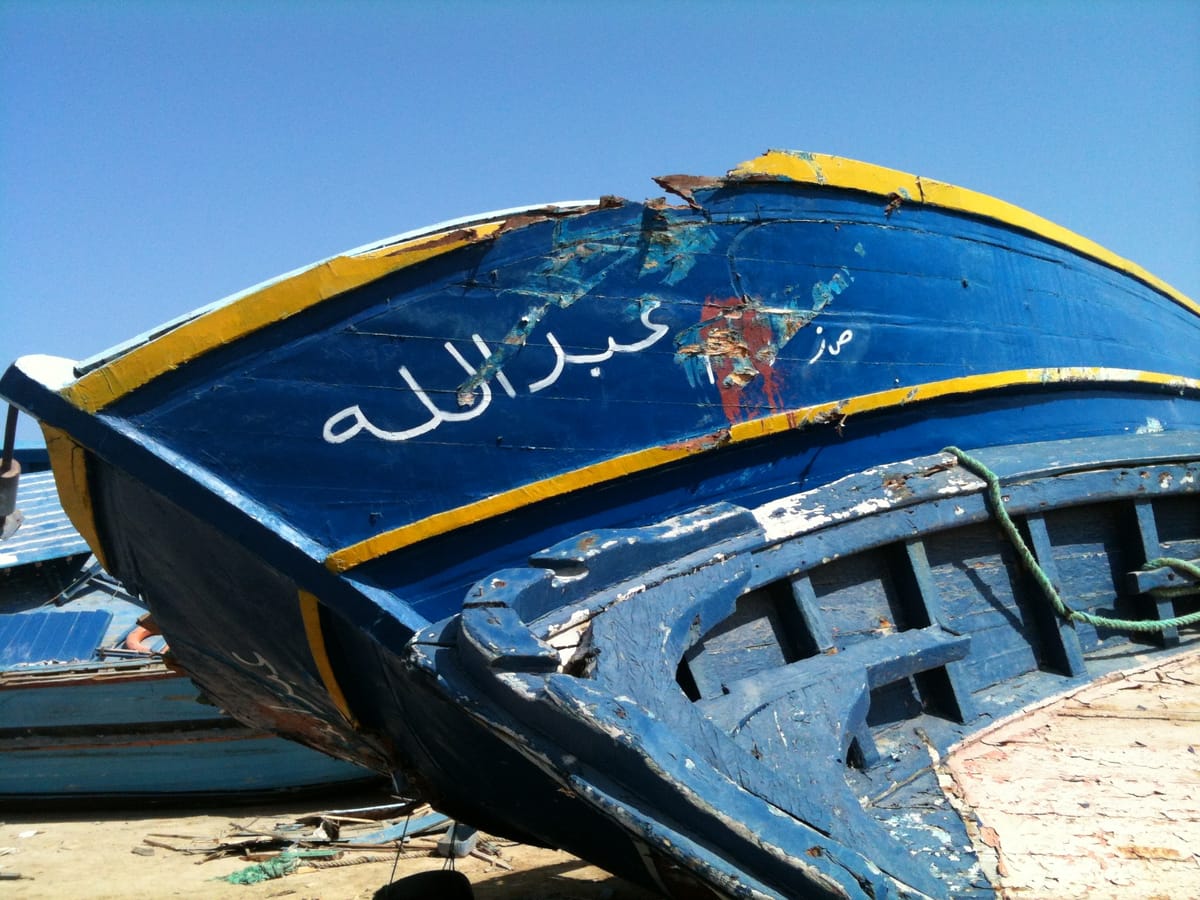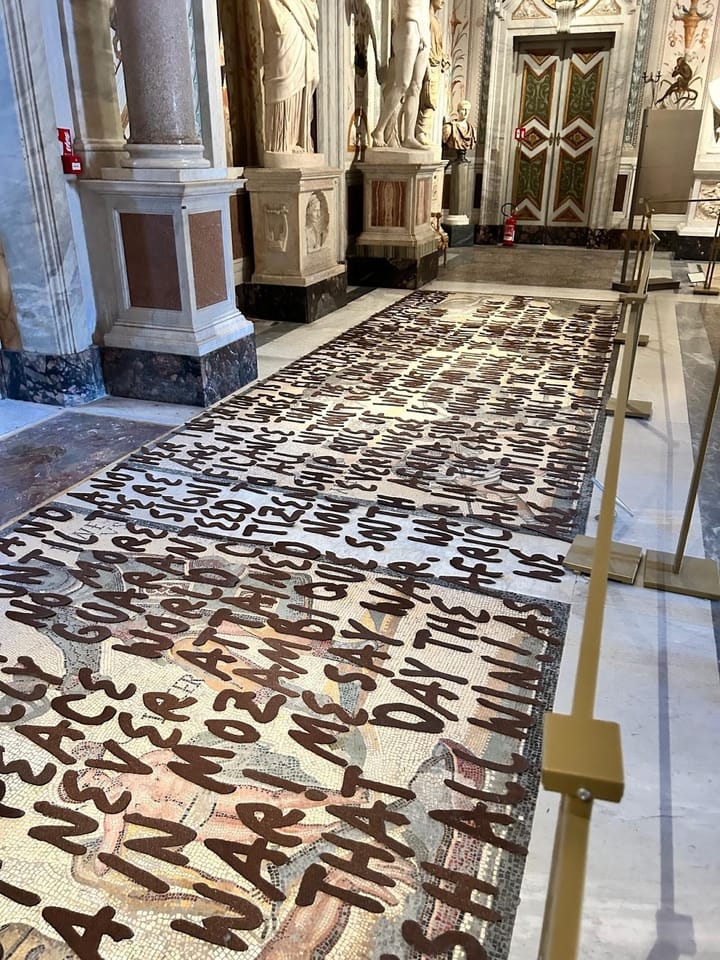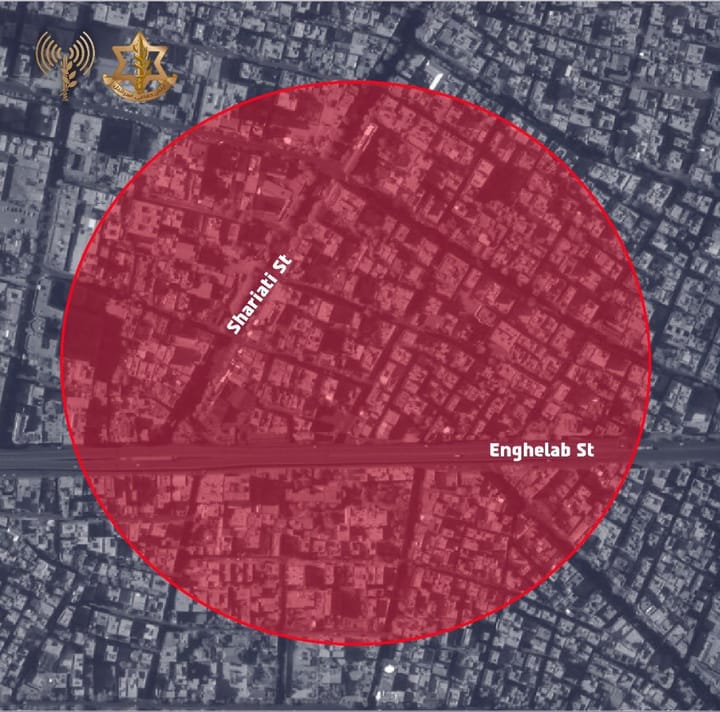Bodies cast into the sea, left to die. This time, not by unscrupulous sea captains but by European legislation. Moving back and forward between the slave trade of yesterday’s Atlantic and those expelled and cast overboard in today’s global order certainly encourages us to interrupt and crease our spacetime with unwelcome proximities. Slaving ships in the early modern Atlantic and small boats crossing today’s Mediterranean are rendered disturbingly proximate. In both cases, human life is reduced to perishable cargo, to objects of economic gain and juridical definition. As Judith Butler puts it, life must be considered a life that can be mourned, as opposed to a denuded, anonymous existence, in order to be considered part of the human community.[1] Otherwise, it is consigned to the dark depths of the sea, ultimately relegated to social death and nothingness. The migrant becomes the zombie, the living dead reduced to the silence of statistics and legal annihilation. She is not allowed to be. Othered, as a difference that makes no difference, she falls out of recognition and the regime of representation.
The contemporary black Mediterranean suggests such a place of non-existence, the site of the not-yet-human who is under the law that expels and negates her to confirm and reinforce the sense of humanity that depends on this distinction and refusal. It signals and sustains a racial apparatus. Like the indistinctness of the sea, the Mediterranean, which hosts the indefinable nature of blackness, poses an ontological question that sets limits for exercising the jurisdiction of the thinking practised on its northern shore. As Aimée Cesaire and Frantz Fanon announced more than half a century ago, it marks the violent confines of European humanism, the limits of critical reason, its ‘racial privilege’, and the white myths of its claims on the world. Its violence is ultimately ontological (Calvin Warren).[2] To contest this ‘ontocide’ is therefore not merely about anti-racism and retooling humanism but proposes the altogether more radical prospect of dissipating the historical and political formation in which anti-racism and humanism seek their premises and procedures. To acknowledge this violence that humanism cannot absorb is to refuse the double-bind of an installed rationality and abandon Europe. In the wake of Fanon, we return to the sea to better acknowledge other shores and currents in the agonistic constitution of the ‘human’.
Commencing from David Marriott’s trenchant criticisms of Achille Mbembe’s theme of the ‘becoming black of the world’, we can perhaps think of the question and problems of a Black Mediterranean that does not simply evoke the transposition of a geo-historical paradigm from one sea (Atlantic) to another (Mediterranean).[3] The adjective black brings into play not only the braided history of race and modernity but also a series of questions that emphasise the need to reorient sharply the critical presumptions that constitute the ‘Black Mediterranean’ as an object and manner of thinking. Or, put more directly, what is this ‘black’ in the Black Mediterranean?
In a densely argued and highly informed critical syntax, Marriott peels away Mbembe’s proposal of the ‘becoming black of the world’. Both writers orbit around the planet of Frantz Fanon. But where Mbembe deploys the Fanonian figure of the damned for the emergent subaltern of a world to be made over in a universal (as opposed to European) humanism, Marriott draws from the Martiniquan’s questioning and psychoanalytically infused language precisely the impossibility of establishing such political bearings and ontological clarity. Put most crudely, the black invented in the exercise of white, European power and who occupies the burden of that position is therefore not a person. She remains a perpetual object of the colonial exercise, caught in an endless and overdetermined dance of recognition/misrecognition that spirals away endlessly and inconclusively. This challenges all attempts at foreclosure and epistemological security. Blackness poses a perpetual question to the language, institutions and powers that presume to define it. To insist on the infinity of analysis, of what cannot be represented yet in being negated is continually registered, is to draw out of the historical depths of the conundrum a fugitive line of escape from the ontological reasoning that sustains the incommensurable status of being black. In this ontological pessimism, black only exists as the negative trope, an object amongst objects, as Fanon put it, instrumental to confirming and sustaining the existing order. She is hailed and interpellated as precisely what the human is not.
So, a blackness identified with colonial spaces and the African diaspora does not simply involve the acknowledgement of an absence or lack leading to the rejuvenation of the human(ist) project. It speaks to a more profound disturbance that cannot be readily fitted into the existing order of thought and the presumed neutrality of its language, scholarly protocols and institutional procedures. More than an excess emerging from the previously excluded and that now requests accommodation lies the radical proposition of confronting the cultural and philosophical architecture that has produced the negation that threatens to ruin it. This is a crude summary of the sophisticated debate that we encounter in the meshing and contrasts between the work of Achille Mbembe and David Marriott and, behind them, the unabsorbed, dissident and perhaps incommensurable (Marriott) psychoanalytically sustained political propositions of Frantz Fanon.[4] The black evoked here, as both historical personhood and figure of thought, is not simply the result of a political economy in which chattel slavery was central, nor of the phantasmagorical fears of the white West.[5] Beneath these histories, today seeking teleological solutions (anti-racism, post-race, post-capital, planetary humanism) is the constant challenge to a modality of reasoning, that is, an epistemology, a theory of knowledge and its philosophical protocols, that emerged precisely from an ontological understanding of being that invented, identified and subsequently expelled and negated the black body and its possibility of personhood.
This is the challenge of the becoming black of the Mediterranean, where the cruel testimony of modern migrants from the non-white world, in an arc that stretches across Africa into Asia, registers not merely the limits of a geopolitical order and its powers but more significantly, the existing culture of appropriation and explanation, both disciplinary and philosophical, political and ethical. Further, the very lexicon I have just employed is itself clearly part of the problem. Elsewhere, I have argued for the importance of abandoning the search for terra-centric conceptual certainties for the fluid indeterminacy of the sea.[6] This allows us to sustain the indeterminacy of these questions without seeking the security of immediate shores: a beginning to reason that supports the limited vessel of rationality without the pretence of a unique route, chart or port of arrival. This is a journey that would necessarily force us to consider a black Mediterranean that requires, as Fanon insisted, the abandonment of Europe and its humanism as the sea subtracts itself from existing claims on the world.
If this touches on the obvious point that the Mediterranean has never been simply European and that its Asian and African shores point us historically and culturally in other directions, it also draws us down into aquatic archives where our bearings become altogether less confident. In other words, messing up geopolitical certainties may lead to altogether less secure seascapes than those that initially promoted the extension of the Occident through planetary colonialism, the same marine medium that today transports those who disturb the metropole that colonised them. But more than a historical phenomenology that registers that there are now many more black people (extended to all non-white or people of colour) in the northern Mediterranean, there lies the more profound impact on the critical languages that pretend to explain, objectify and frame the black individual precisely at the point when the object refuses to remain as such. This is not simply a historical or cultural observation. It is a philosophical and epistemological one. It is not merely about affirming the potential of a Black Mediterranean as a counter-space and alternative history of the present.
What constitutes the black migrant? The adjective, Mbembe seems partly to be suggesting, is a synonym for the subaltern and the non-white world. Also, in Fanon (and Marriott), there is a tendential slippage between black Africans (in the diaspora, in subsaharan Africa) and other subaltern bodies (North African, Western Asia, Arab).[7] Cedric Robinson’s considerations on the formation of racial capitalism in the Mediterranean powerfully echo such considerations in his crucial reopening of the Mediterranean archive to the history of racial capitalism.[8] So, is the becoming black of the world today about Africa crossing the Mediterranean and taking up residence in Europe, or is it suggesting even wider horizons? Is the adjective transmuting into a substantive body (of thought, of life, of being)?
If there is no single or definitive answer, we are nevertheless encouraged to register more than a sociological or historical observation. This means registering, hearing, and acknowledging what we cannot represent. Language, even the most powerful, has its limits. It is never transparent nor always translatable. Considering this void and introducing a debate that has matured in the Black Atlantic and critical race studies encourages us to disengage from a particular political and philosophical formation that appears oblivious to the emergence of these questions. If this is where the white voice of critical authority necessarily falters and perhaps learns to inhabit the ruins of its language, it leaves us with a gap, a fissure, that should not (and cannot) be closed. To treat this caesura affirmatively, rather than remain defending antiracism and migrants’ rights, deepens a critical language that escapes unilateral reasoning. More than the acknowledgement of an obvious Eurocentrism, what we encounter here is the potential breakup of a hegemonic political and philosophical order. If politicians, behind the facade of placid multiculturalism, tendentially retreat to the defence of Occidental ‘values’ and ultimately whiteness, philosophy (I have in mind the Italian cases of Agamben, Cacciari and Esposito) is overwhelmingly silent, burrowing ever deeper into the conceptual theology of its ‘origins’. Both are enmeshed in ensuring the colourless myths of purity. If the distinction is most obviously racial, it is also epistemological. Seeking to externalise and expel blackness and refusing to respond to creolisation, Occidental thought constitutes itself through the rejection and expulsion of what is paradoxically inherent to its making. It refuses to accommodate the racialised body it produced. Here, as Marriott would put it, reason operates a ‘racial jurisdiction’.[9]
Meanwhile, what is happening at sea and is being washed ashore is a disturbance destined to rock the ship of fools that passes for institutional politics. Learning to swim in these waters, which, like all seas, can be rough, opaque and threatening, constitutes another geo-philosophical spacetime and another accounting of modernity. It may well be unauthorised and unacknowledged, but it certainly exists, resists and will persist. Crossing the fluidity of marine archives with the becoming black that can never arrive in the present order of things is precisely where the Black Mediterranean provokes both a theoretical shipwreck and the announcement of a very different critical space. Precisely because it forces a break with the representational reasoning that guarantees methodologies, disciplines and their histories, it promotes a critical compass that allows us to begin to chart the shattered mirror of the Mediterranean as ego (mare nostrum) and object (geopolitical, historical, anthropological, sociological). More than an irreducible excess or marking the limits of language where words fall silent, the Black Mediterranean proposes an archive that overflows the order of the present without the consolation of claiming a shore or being ‘bleached white by ontology or representation.’[10]
So, ‘Black Athena,’ as proposed in Martin Bernal's speculative and probably inaccurate research or as sung by the Neapolitan dub group Almamegretta, is perhaps not so much about the correct recovery of forgotten histories as a disturbing ingression that taps into the precise potential of responding to unauthorised reconfigurations and the Mediterranean still to come.
Finally, remaining with music as central to the modern black experience of the world is perhaps where those Fanonian ‘fragments put together by another me’ temporarily come together.[11] External to established institutional time and yet in time, extraneous and yet simultaneously in the pulse, black music historically sustains another horizon. As David Marriott would indeed argue, it proposes a manner of inhabiting and sounding the abyss (Bob Marley’s ‘bottomless pit’) precisely where being black is not recognised. Reduced to a style and a genre, black bodies only enter a world that wants them solely as objects. Music, as the refusal of meaning, here acquires all of its (ontological?) potency.
Perhaps the extemporaneous scream of James Brown or the vocal slipping and sliding of Beyoncé, or closer to the Mediterranean, the singing and loud playing of the Palestinian Kamilya Jubran, cracks humanistic hermeneutics, not by proposing an alternative but by insistently dancing on the edge of endorsed time, living the limits that signal ontological breakdown and another constellation of bodies and figures of thought. In his implacable rigour, David Marriott explicitly dismisses this possibility:
The attempt to descend deeper ever deeper within being, to find the essence of being as rhythm, eroticism, nonviolent logos, élan vital, possesses nothing but falsehood; so false that even the desire to counter destiny with myth, to proclaim a dark Dionysus, only proves how far blackness is from things in themselves, from the categorial law of understanding.[12]
But that precisely is the point. Blackness challenges the humanist cage and is not there to mirror my language and concerns. In this inescapable reckoning with the continuing whitening of the world solely within the very language that such a world authorises, there is no escape, and blackness is not ‘yet in being’.[13] So, it remains as a question, an interrogation, an interruption. At this point, and to return to the Mediterranean Sea, we can hear and feel something altogether more portentous than the economic and social registration of migration, racism and ethno-nationalism. In the (im)possibility of becoming black, the Mediterranean enacts a radical undoing of the existing chains of meaning. It casts us into the divide between the challenge of the absolute alterity of blackness – but what if there is no blackness more than there is whiteness, as Fanon suggests in Peau Noire, Masques Blancs (1952): ‘Le nègre n’est pas. Pas plus que le Blanc.’ – and the historical constellation of its configurations.[14] The national narrative is exposed to what it strenuously seeks to exclude. The West, as the measure of the world, is undone. The roots of thought, identity and belonging are rendered homeless and required to migrate to spaces not of their choosing. The European ‘home’, its archives and histories, now exposed to the winds that blow across its landscapes and seascapes, begin to shake under the gusts of what it is ontologically unable to register and respond to.
[1]Judith Butler, Frames of War: When is Life Grievable, London, Verso, 2016.
[2]Calvin Warren, ‘Onticide. Afro-pessimism, Gay Nigger #1, and Surplus Violence’, GLQ, 23, 3, 2017.
[3]David Marriott, ‘The becoming-black of the world?’. On Achille Mbembe’s Critique of Black Reason’, Radical Philosophy, 2.02, June 2018.
[4]Ibid, 71.
[5]Calvin Warren, op.cit.
[6]Iain Chambers, ‘Its About Time. Some notes on quantum history’, Postcolonial Studies, 26:4, 2023.
[7]See Nichola Anthony Eppert’s review of David Marriott’s Whither Fanon. Studies in the Blackness of Being, Stanford, Stanford University Press, 2018: ‘Freedom is a constant erasure’, Radical Philosophy, 2.06, Winter 2019.
[8]Cedric Robinson, Black Marxism. The Making of the Black Radical Tradition, London, Penguin, 2021.
[9] David Marriott, ‘The becoming-black of the world?’. On Achille Mbembe’s Critique of Black Reason’, 62
[10]David Marriott, Of Effacement: Blackness and Non-Being, Stanford: Stanford University Press, 2024, 9.
[11]Frantz Fanon, Black Skin, White Masks, trans, Richard Philcox, New York: Grove Press, 2008, 89.
[12] David Marriott, Of Effacement: Blackness and Non-Being, Stanford: Stanford University Press, 2024, 25-6.
[13]Ibid, 28.
[14] I would like to thank Ranjana Khanna for underlining this point.
Iain Chambers studied at the Centre for Contemporary Cultural Studies at Birmingham University before moving to Naples, where he taught Cultural, Postcolonial and Mediterranean Studies at the University of Naples, L’Orientale. He is presently an independent researcher and writes regularly for the Italian daily il Manifesto. Among his publications are Migrancy, Culture, Identity (1994), Mediterranean Crossings (2008), Postcolonial Interruptions, Unauthorised Modernities (2017), and with Marta Cariello, The Mediterranean Question (2025). With Lidia Curti, he edited the volume The Postcolonial Question. Common Skies, Divided Horizons (1995). In 2022, he participated in documenta fifteen as a member of the collective «Jimmie Durham & A Stick in the Forest by the Side of the Road»



